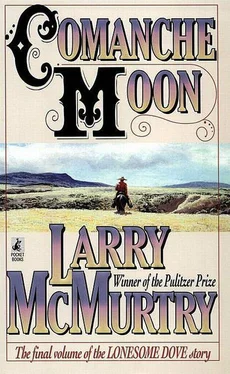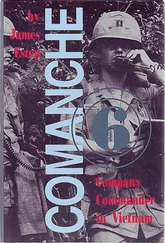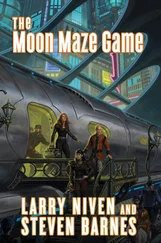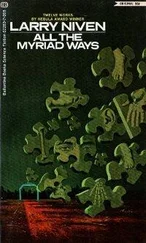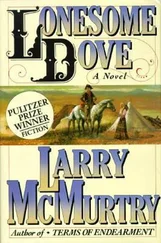What made it worse was that Gus McCrae looked so low and sad.
Sometimes Maggie wondered why she had fixed her heart on Call, and not on Gus--she and Gus were more adaptable people than Woodrow ever had been or ever would be. She thought she could have stayed alive and done nicely by Augustus, had she felt for him what a wife should feel for a husband; and yet, through the years, it was Woodrow she loved and Jake she tolerated. Even then, walking up the street behind the wagon, Maggie felt her spirits droop a little because Woodrow, mindful of the solemnity of the occasion, had walked past them without a nod or a glance.
The hope Maggie held, above all, was that her son would be able to live a respectable life.
She herself might manage to die respectable, but she had not lived respectable, not for much of her life; she placed a high value on it and wanted it for her son. He might never manage to be a hero, as his father was; he might never even be called to do battle--Maggie hoped he wouldn't. But it wasn't necessary to fight Indians or arrest bandits to be respectable.
Respectability was a matter of training and guidance--learning not to wink in funerals, for example, or keeping one's eyes closed during prayer.
There was no managing Jake Spoon, though; there never had been. Maggie knew it, and it was bittersweet knowledge, because, for all his faults, Jake did his best to help her, and had for the whole time she had had Newt. It was Jake who carried her groceries home, if he noticed that she was heavily laden; Jake that tacked up a little shelf in her kitchen, to hold the crockery--Jake Spoon did the chores that Woodrow Call would rarely unbend to do, even if he had the time. Maggie knew her own weaknesses: she could not do entirely without a man, could not be alone always, could not survive and raise her son well without more help than Woodrow Call gave her.
Call and Gus were not heroes to the people for nothing; they were constantly on patrol along the line of the frontier. Skirmishes with the Comanches were frequent, and the border was very unsettled. Call and Gus were always gone but Jake Spoon was usually left at home--he had had the prudence to take a course in penmanship and wrote the neatest hand in the company. There was a man in the legislature, a senator named Sumerskin, who considered the rangers profligate in the matter of expenses. He hectored Call and Gus to produce accountings down to the last horseshoe nail, a vexation that both captains found hard to tolerate. Though Jake Spoon could shoot and might occasionally produce a dashing bit of derring-d during a fracas, he was also lazy, careless of his tack, and prone to exhausting the troop by leading singsongs all night. His main use when they were after bandits was that he could tie the most elegant hang knots in the troop.
Bandits hung with one of Jake's nooses rarely danced or kicked more than a few seconds.
Call, though, could barely tolerate Jake's laziness--Augustus, though an inspired fighter, provided more than enough laziness for any one troop, Call considered, so, usually, Jake got left at home to keep the company records in his elegant hand. He would wad up page after page of ledger paper until he had his columns exact and the loops and curves of his letters precisely as he wanted them to be.
Where Woodrow Call was concerned, Maggie's hopes shrank, year by year, to one need: the need to have Call give Newt his name. She no longer supposed, even in her most hopeful moments, that Woodrow would marry her. It wasn't that he scorned her because of her past, either; the bitter truth Maggie slowly came to accept was that Woodrow Call liked being alone; he liked his solitude as much as Gus and Jake liked female company.
"Woodrow just ain't the marrying kind, Mag," Augustus said to her, on more than one occasion, and he was right.
Still, every time Maggie saw Woodrow her heart fluttered, although she knew that a fluttering heart could not change such things. She ceased mentioning marriage to him; even, in time, ceased to think about it. It had been the central hope of her life, but it wasn't to be. What she didn't cease to think about was Newt. Newt was the spitting image of his father: the two of them walked alike, talked alike, had the same smile and the same forehead, yet Call would not give Newt his name.
The resemblances Maggie catalogued-- resemblances that were obvious to everyone in Austin-- didn't convince him; or, if they did convince him, he hid the realization from himself. Often Maggie could not contain her bitterness at his refusal; she quarrelled with him about it, sometimes loudly. Once on a hot still day they quarrelled so loudly that their argument woke Pea Eye, who had been dozing below them, in the shade of the building.
Maggie knew Pea Eye overheard them; she happened to look out the window and saw his startled face turned up in surprise.
That Newt would someday bear his father's name was the one hope Maggie would not relinquish, though she came to realize that no effort of hers would make it happen. Her hope, she felt, lay with Newt himself--z the boy grew, his own sweetness might have an effect on Woodrow that she herself had not been able to have. All the rangers liked Newt; they kept him with them whenever they could. They sat him on their horses, whittled him toy guns, let him pet the crippled possum that Lee Hitch found in the hay one morning and adopted. As Newt grew they taught him little skills, and Newt was a quick pupil. All of them, Maggie was convinced, knew he was Call's.
Now, in the strong sunlight, the crowd followed the wagon with the coffin in toward the green cemetery by the river. Maggie heard, all about her, murmurs about the war. She scarcely knew herself what it meant; she longed for a moment with Woodrow, so he could explain it. But he had not, as she hoped, dropped back to walk with her. Instead, it was Jake Spoon who dropped back, when they were almost to the graveyard. Jake had a habit of touching her in public that Maggie despised; she worked in a store now, she had a respectable job, but even if she hadn't she would not have wanted Jake to touch her in public. Even in private her acceptance of him had some reluctance in it. When he attempted to touch her arm Maggie drew away.
"You oughtn't to be winking at Newt--not at a funeral," she reproached him.
Jake, though, could not be managed. He turned to Newt and winked again.
"Why, the preaching was over," he said. "There's no harm in a wink. Nobody noticed, anyway. All they can think about is the war. It's a wonder anybody even came to see Nellie buried.
"Gus does have poor luck with wives," he added. "If I was a woman I'd think twice before hitching up with him--it'd be a death sentence." "I wish you'd be nice," Maggie whispered.
"I just wish you'd be nice. You can be nice, Jake, when you try." Maggie knew that Jake Spoon wasn't really bad; but neither was he really good, either. Though he was capable of sweetness, at times, she often felt that she would be better off having no man than a man like Jake; but, if she sent him away, Newt would be the lonelier for it. She never completely turned Jake out, though she was often tempted to. It vexed her that she was spending so much of her energy on a large child, when there was a better man, one she had long loved, not one hundred yards away--yet, there it was.
"I see Deets," Newt whispered, as the procession reached the little graveyard. Sure enough, Deets and two other Negroes, men who had worked for Nellie McCrae or her family, stood deferentially, waiting, near a grove of trees.
Newt was wondering if Graciela had died of the snakebite, in which case they might have to bury her, too, when they got back home. He did like Graciela; she gave him honey cakes and taught him how to tie little threads on grasshoppers' legs and make them pull sticks along, like tiny wagons. But if Graciela had died and they had to go through the singing and praying again, it would be a long time before he got to play.
Читать дальше
